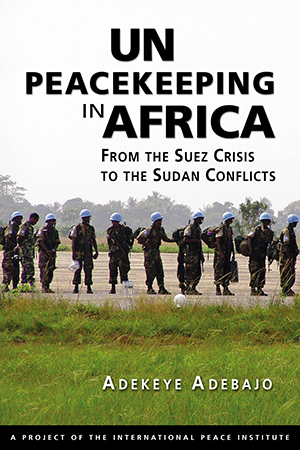Nearly half of all UN peacekeeping missions in the post–Cold War era have been in Africa, and the continent currently hosts the greatest number (and also the largest) of such missions in the world. Uniquely assessing five decades of UN peacekeeping in Africa, Adekeye Adebajo focuses on a series of questions: What accounts for the resurgence of UN peacekeeping efforts in Africa after the Cold War? What are the factors that have determined the success, or contributed to the failure, of the missions? Does the mandating of so many peacekeeping missions signify the failure of Africa's regional security organizations? And, crucially, how can a new division of labor be established between the UN and Africa's security organizations to more effectively manage conflicts on the continent?
Adebajo's historically informed approach provides an in-depth analysis of the key domestic, regional, and external factors that shaped the outcomes of fifteen UN missions, offering critical lessons for future peacekeeping efforts in Africa and beyond.
Adekeye Adebajo is professor and senior research fellow at the University of Pretoria's Centre for the Advancement of Scholarship. His numerous publications include The Curse of Berlin: Africa After the Cold War, From Global Apartheid to Global Village: Africa and the United Nations, Liberia's Civil War: Nigeria, ECOMOG, and Regional Security in West Africa, and Building Peace in West Africa: Liberia, Sierra Leone, and Guinea-Bissau.
No rights in Africa"An excellent delineation of the key issues and actors involved in the United Nations peacekeeping efforts in Africa during the last half century."—Agber Dimah, Africa Today
"Adebajo has crafted a concise yet remarkably detailed account of UN engagement in some of the world’s most intractable conflicts.... An engaging read for anyone interested in peacekeeping, its modern evolution, and the complexities of UN missions and those of their regional counterparts." —Matthew T. Klick, Global Governance
"Something of a tour de force.... The volume gives a genuine overview and taste for the range and pitfalls of [UN peacekeeping operations in Africa]."—Chandra Lekha Sriram, International Affairs
"The arguments are substantial and clear in this well-researched book."—Choice
"Africa is where the UN peacekeeping action is, and no one is better placed than Adekeye Adebajo to examine the shibboleths about calculations by the great powers and by African states, large and small, to enter the fray. His history and analysis are essential reading."—Thomas G. Weiss, CUNY Graduate Center
"Adebajo's book clearly identifies the most crucial domestic, regional, and international factors that make peace operations in Africa a success or a failure. It is an essential tool for academicians and practitioners who want to learn from the past and work for the future."—Aldo Ajello, form UN Special Representative in Mozambique
"Adebajo clearly demonstrates how the great powers can make or break particular UN peace operations. His book will not make for comfortable reading in Western capitals, but it offers some sensible conclusions about how better operations might be forged in arguably their most difficult crucible."—Paul D. Williams, George Washington University






